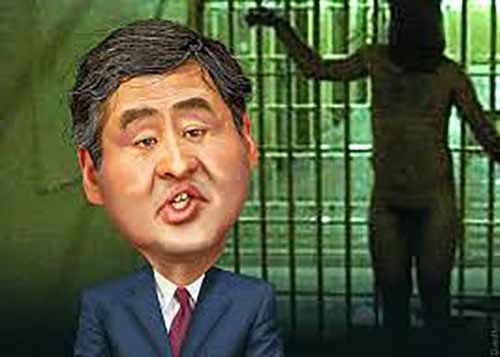
John Yoo (from FireJohnYoo.net)
August 21, 2014
Professor John Yoo stepped away from his lectern at the UC Berkeley School of Law to send an e-mail to the San Francisco Chronicle criticizing the forthcoming Senate Select Committee on Intelligence (SSCI) torture report saying that if “torture was used and it didn’t work, she [Senator Dianne Feinstein] is flat wrong.”
Yoo claimed the report failed to maintain “bipartisanship” that “will undermine its conclusions.” This is a preemptive attack by Yoo as the release of the Senate torture report will probably place Yoo on the hot-seat again.
The SSCI Torture report has been approved for public release. However, the SSCI and the CIA are fighting over the CIA’s substantial redactions to the torture report summary. The torture report is 6,000 pages, adopted by the SSCI in December 2012. It is the most comprehensive report on the CIA’s use of “enhanced interrogation techniques,” a euphemism for torture.
Reportedly, the SSCI report found that the CIA misled Congress, the Justice Department and President George W. Bush about the “effectiveness” of torture methods such as waterboarding, shackling prisoners in painful positions and slamming detainees against walls. The report also reportedly found that those abuses did not help locate Osama bin Laden or thwart any terrorist plots and were counterproductive.
In addition to the SSCI torture report, there is a CIA response to the SSCI torture report defending the agency’s actions. A third report, commissioned by former CIA Director Leon Panetta, is reportedly consistent with the SSCI torture report findings, but contradicts the CIA’s response to the torture report. it is not clear whether these reports will be released.
John Yoo served as Deputy Assistant U.S. Attorney General in the Office of Legal Counsel (OLC) where he drafted a legal rationale (part 1, memo 2) for “enhanced interrogation techniques,” which included stress positions, sleep deprivation and simulated drowning known as “waterboarding.” The memorandum were signed off on by Assistant Attorney General Jay S. Bybee, head of the Office of Legal Counsel of the U.S. Department of Justice. Yoo, stretching the unitary executive theory, argued that Bush’s executive powers gave him the right in the “war on terror” to authorize the use of torture. And he further argued that the president was above the law and under certain circumstance was in control of the other branches of government.
In addition, the memos argued that criminal law doesn’t prohibit torture because it doesn’t apply to the military. Treaties and the War Crimes Act do not prohibit torture because they only apply to uniformed enemy soldiers. Federal statutes prohibiting torture don’t prohibit torture because they don’t apply to conduct on military bases.
In 2003, following the accounts of the torture and prisoner abuse at Abu Ghraib in Iraq, Yoo wrote another memo concluding, “federal laws against torture, assault and maiming would not apply to the overseas interrogation of terror suspects.” This was used as justification for the abusive treatment of prisoners at the Guantánamo Bay detention camp.
After releasing the torture memos, President Barack Obama acknowledged that “we tortured some folks.” Obama repudiated these memos on January 22, 2009.
How could John Yoo, in spite of the near universal understanding among thinking people that these techniques, especially waterboarding, constituted torture, write such justifications for their use, which led inevitably to the abuses at Abu Ghraib, Guantánamo Bay and the extraordinary rendition program (secret abductions and transfers of prisoners to other countries where torture was used)? By using torture, we lost any ideological advantage we might have had — the promotion of democracy, freedom and human rights. We become the thugs our enemies say we are. John Yoo bears some responsibility for the inevitable consequences of his memos laying a “legal” basis for the U.S. use of torture
All misdeeds, however, do not go unrewarded. This year, Yoo was awarded an endowed faculty chair at University of California Berkeley School of Law. He has much to teach the future lawyers of America.
In July 2014, U.C. Berkeley students, alumni and a group of lawyers in the Bay Area initiated an online petition to rescind Yoo’s recent faculty chair endowment. The release of the SSCI torture report should provide additional weight to this petition drive.
I look forward to the release of the SSCI torture report.


 The Hunger Site
The Hunger Site
June 5, 2015 at 5:26 pm
Ralph I’d like to meet for coffee. I have intel about DV. Contact Patricia: pkf.empower@gmail.com